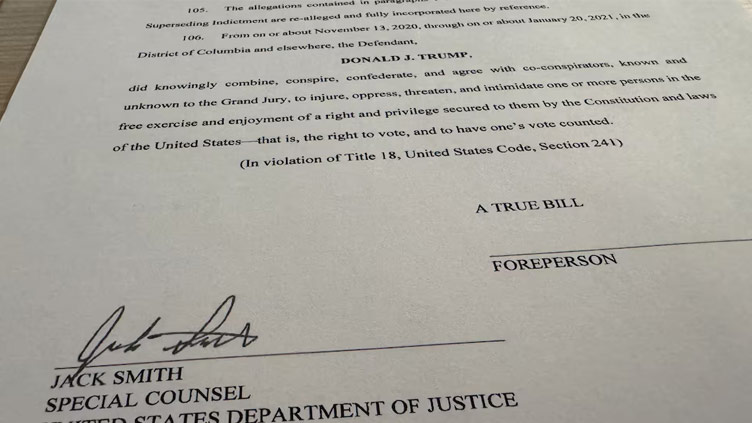US prosecutor Jack Smith defends criminal case against Trump

World
Smith defended his investigation and the prosecutors who worked on it
WASHINGTON (Reuters) - U.S. Special Counsel Jack Smith concluded that Donald Trump engaged in an "unprecedented criminal effort" to hold on to power after losing the 2020 election, but was thwarted in bringing the case to trial by the president-elect's November election victory, according to a report published on Tuesday.
The report details Smith's decision to bring a four-count indictment against Trump, accusing him of plotting to obstruct the collection and certification of votes following his 2020 defeat by Democratic President Joe Biden.
It concludes that the evidence would have been enough to convict Trump at trial, but his imminent return to the presidency, set for Jan. 20, made that impossible.
Smith, who has faced relentless criticism from Trump, also defended his investigation and the prosecutors who worked on it.
"The claim from Mr. Trump that my decisions as a prosecutor were influenced or directed by the Biden administration or other political actors is, in a word, laughable," Smith wrote in a letter detailing his report.
After the release, Trump, in a post on his Truth Social site, called Smith a "lamebrain prosecutor who was unable to get his case tried before the election."
Trump's lawyers, in a letter to Attorney General Merrick Garland made public by the Justice Department, called the report a "politically-motivated attack" and said releasing it ahead of Trump's return to the White House would harm the presidential transition.
Much of the evidence cited in the report has been previously made public.
But it includes some new details, such as that prosecutors considered charging Trump with inciting the Jan. 6, 2021 attack on the U.S. Capitol under a U.S. law known as the Insurrection Act.
Prosecutors ultimately concluded that such a charge posed legal risks and there was insufficient evidence that Trump intended for the "full scope" of violence during the riot, a failed attempt by a mob of his supporters to stop Congress from certifying the 2020 election.
The indictment charged Trump with conspiring to obstruct the election certification, defraud the United States of accurate election results and deprive U.S. voters of their voting rights.
Several of Trump's former lawyers had previously been identified as co-conspirators referenced in the indictment.
Smith, who left the Justice Department last week, dropped both cases against Trump after he won last year’s election, citing a longstanding Justice Department policy against prosecuting a sitting president. Neither reached a trial.
Trump pleaded not guilty to all charges. Regularly assailing Smith as "deranged," Trump depicted the cases as politically motivated attempts to damage his campaign and political movement.
Trump and his two former co-defendants in the classified documents case sought to block the release of the report, days before Trump is set to return to office on Jan. 20. Courts rebuffed their demands to prevent its publication altogether.
U.S. District Judge Aileen Cannon, who presided over the documents case, has ordered the Justice Department for now to halt plans to allow certain senior members of Congress to privately review the documents section of the report.
Prosecutors gave a detailed view of their case against Trump in previous court filings. A congressional panel in 2022 published its own 700-page account of Trump’s actions following the 2020 election.
Both investigations concluded that Trump spread false claims of widespread voter fraud following the 2020 election and pressured state lawmakers not to certify the vote, and ultimately, also sought to use fraudulent groups of electors pledged to vote for Trump, in states actually won by Biden, in a bid to stop Congress from certifying Biden's win.
The effort culminated in the Jan. 6, 2021 attack on the U.S. Capitol, when a mob of Trump supporters stormed Congress in a failed attempt to stop lawmakers from certifying the vote.
Smith's case faced legal hurdles even before Trump's election win. It was paused for months while Trump pressed his claim that he could not be prosecuted for official actions taken as president.
The Supreme Court's conservative majority largely sided with him, granting former presidents broad immunity from criminal prosecution.


